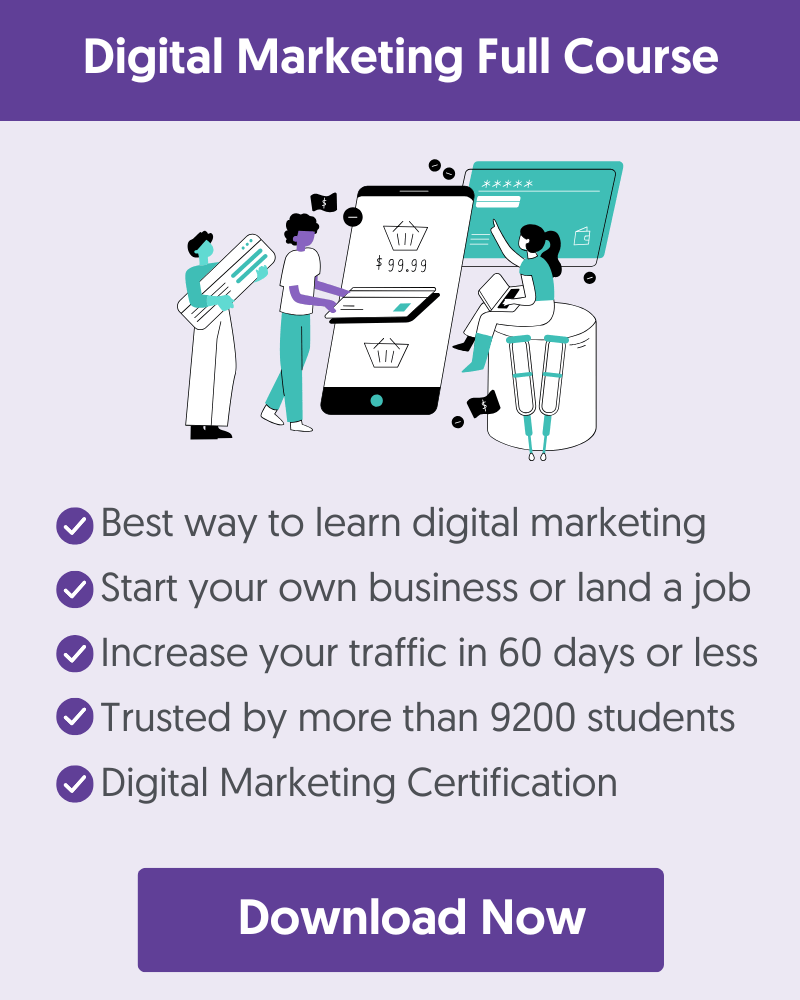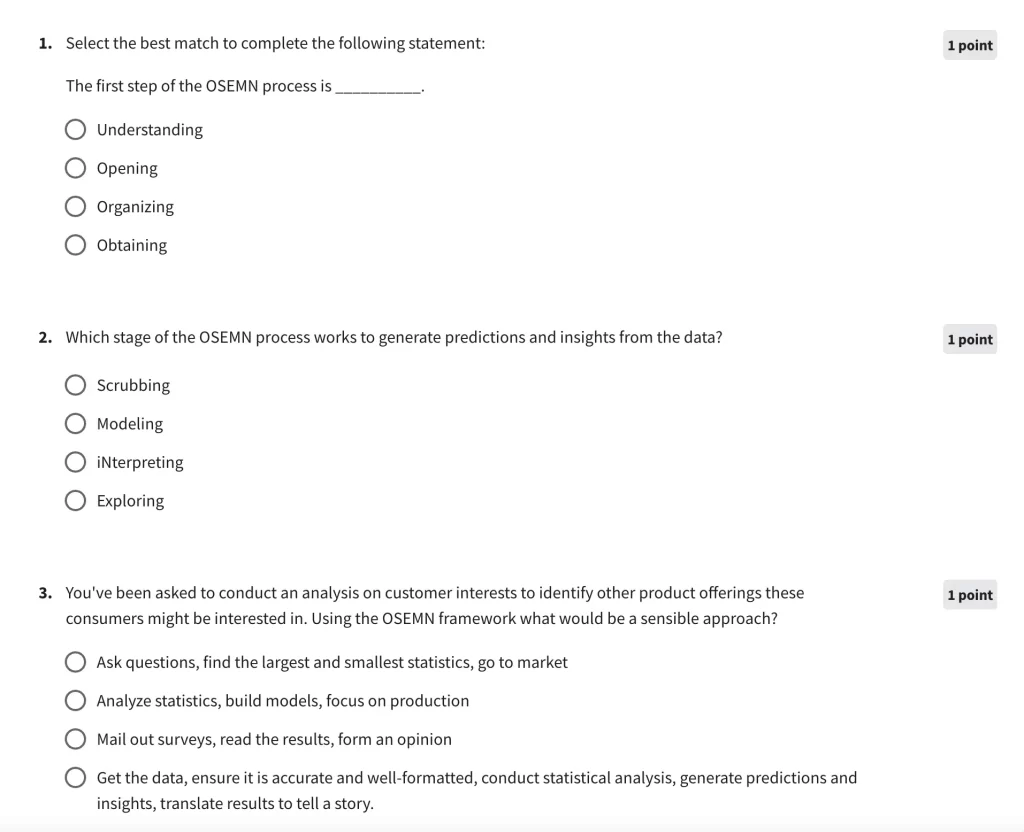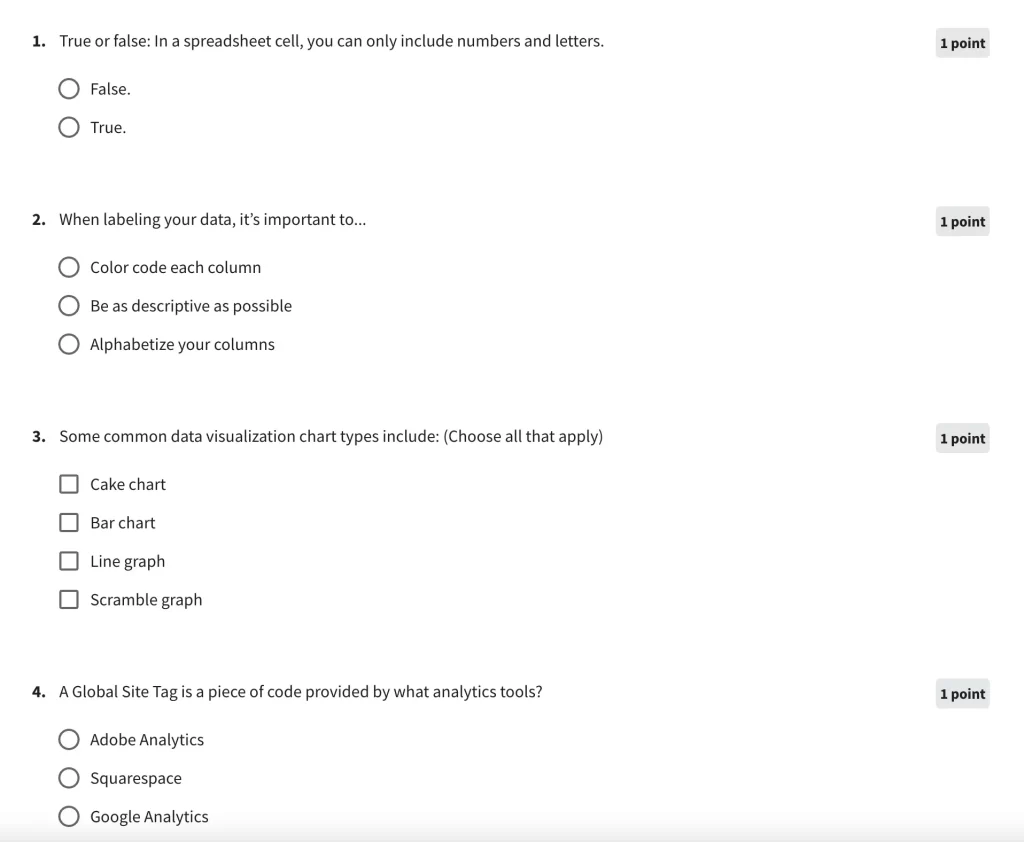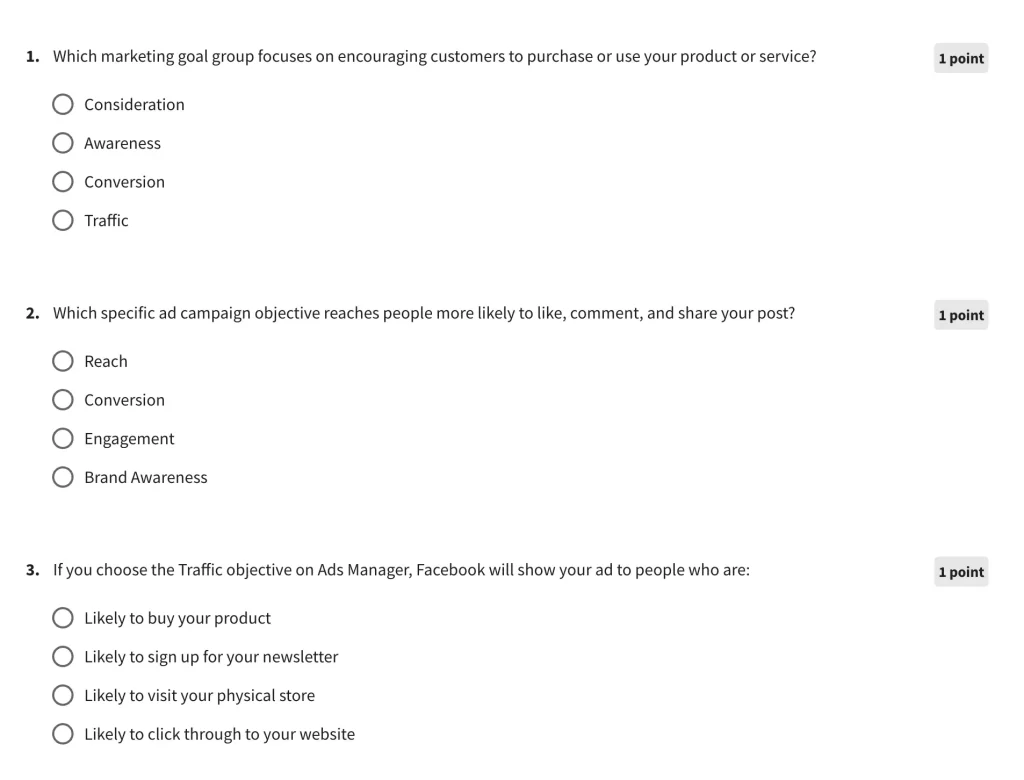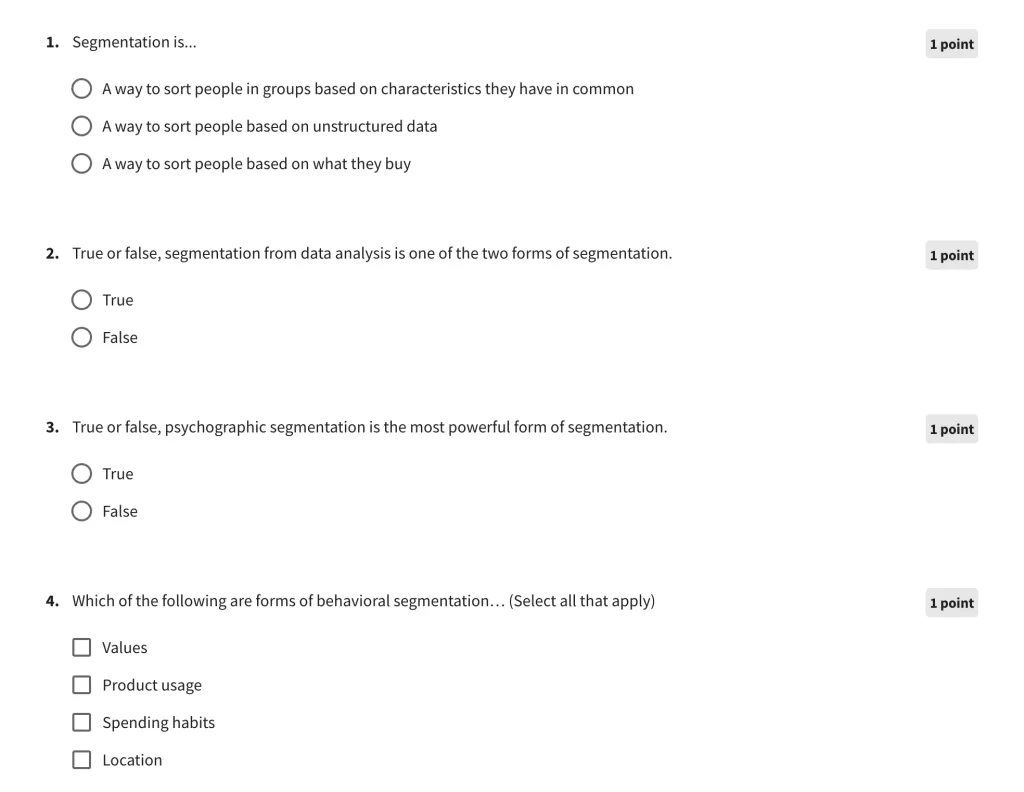- What is Meta Marketing Analytics Certificate?
- How Much Does Meta Marketing Analytics Certificate Cost?
- Meta Marketing Analytics Certificate Contents
- Meta Marketing Analytics Certificate Exams
- How Hard is the Meta Marketing Analytics Certificate?
- Is the Meta Marketing Analytics Certificate Worth it?
- Other Meta Career Certifications
In today’s review, we’re exploring the Meta Marketing Analytics Professional certificate. Created by one of the world’s leading social media brands, this hands-on training course covers everything students need to know to kickstart a career in marketing analysis.
By the end of this review, you’ll have a clear insight into everything you can learn from Meta’s Analytics certificate, how long it will take to earn your credentials, and what costs are involved.
The Meta Marketing Analytics Professional certificate is a great certification to pursue if you want to work as a data analyst. The lessons can be completed in less than 7 months and the total cost is below $300.
It’s perfect for beginners and for those looking to build job-ready skills in one of the most in-demand areas of IT and marketing.
What is Meta Marketing Analytics Certificate?
The Meta Marketing Analytics Certificate is a comprehensive guide to social media marketing science. The course is designed for beginners, with no need for any prior experience in the analytics field. However, it may be helpful to have a basic knowledge of Meta tools like Instagram and Facebook.
Split into a series of six courses, the program was designed by Meta marketers and professionals from Aptly (an online education production company).
The lessons cover everything students need to know about the basics of marketing, and how to use data to make crucial campaign decisions.
While the primary focus of the course is on Meta assets like Facebook, you’ll also develop some transferrable skills on topics like how to identify, sort, and visualize data analytics.
The course includes hands-on projects for practicing your skills and comes with a reputable certification provided by Coursera and Meta.
Students who successfully complete this course will gain access to the Meta Certification Career Network, where they can search for and apply for jobs with Meta partners.
Who Should Follow this Certificate?
This Meta course is specifically designed for anyone with an interest in marketing analytics. You’ll need no prior knowledge to get started, and can build the skills required for an analyst career from scratch. This course prepares students for a role as either a marketing analyst or marketing researcher.
The lessons can also be extremely useful to social media marketing specialists who want to expand their skills by learning how to optimize their campaigns. Business leaders planning on running their own social strategies can also benefit from being able to visualize and leverage data.
What You’ll Learn?
The Meta Marketing Analytics Professional Certificate covers all the in-demand skills professionals need to launch a career in marketing analytics. You’ll learn all the basic principles involved in creating a successful advertising campaign, and how to apply OSEMN data analysis frameworks to answer common questions.
The six-course program includes full guidance to common statistical models business leaders use to segment audiences, evaluate sales funnels, analyze campaign results, and optimize the growing digital marketing mix.
What’s more, students gain behind-the-scenes insight into using tools like SQL and Python for collecting, connecting, and understanding data.
This course includes a number of hands-on projects where users can learn to visualize data using Tableau or create test campaigns with Meta Ads Manager. There are also various resources to prepare you for taking the “Meta Marketing Science” exam at the end of the course.
By the time you complete this certification, you’ll have a clear understanding of:
- How to identify and capture data
- Using Python and similar tools to sort data
- Visualizing results through Tableau
- Evaluating and optimizing advertising effectiveness
- Building and enhancing sales funnels
- How to use Meta Ads Manager for ad campaigns
Time Investment and Certification
The time needed to complete the Meta Marketing Analytics Certificate is seven months (studying 4 hours per week) and can be completed 100% online.
There are over 100 hours of content included in this course, delivered through video, practical experiments, and written resources.
To gain your Meta Marketing Analytics Certificate, you will need to complete all 6 courses, and pass the “Marketing Science” examination. There are also various quizzes and assignments to complete through each module.
How Much Does Meta Marketing Analytics Certificate Cost?
The total cost to get the Meta Marketing Analytics Certificate is $273. The course is offered by Coursera through the Coursera Plus subscription which costs $39 per month. On average it takes 7 months for students to complete the course and get certified.
Coursera offers a 7-day free trial to review the course material before committing to a paid plan.
Meta Marketing Analytics Certificate Contents
- Marketing Analytics Foundation
- Introduction to Data Analytics
- Statistics for Marketing
- Data Analytics Methods for Marketing
- Marketing Analytics with Meta
- Meta Marketing Science Certification Exam
Course 1: Marketing Analytics Foundation
The first course in the Meta Marketing Analytics Professional Certificate introduces students to the basics of evaluating advertising campaigns. You’ll start with an introduction to the basic principles of marketing, and how data analytics influence the outcome of campaigns.
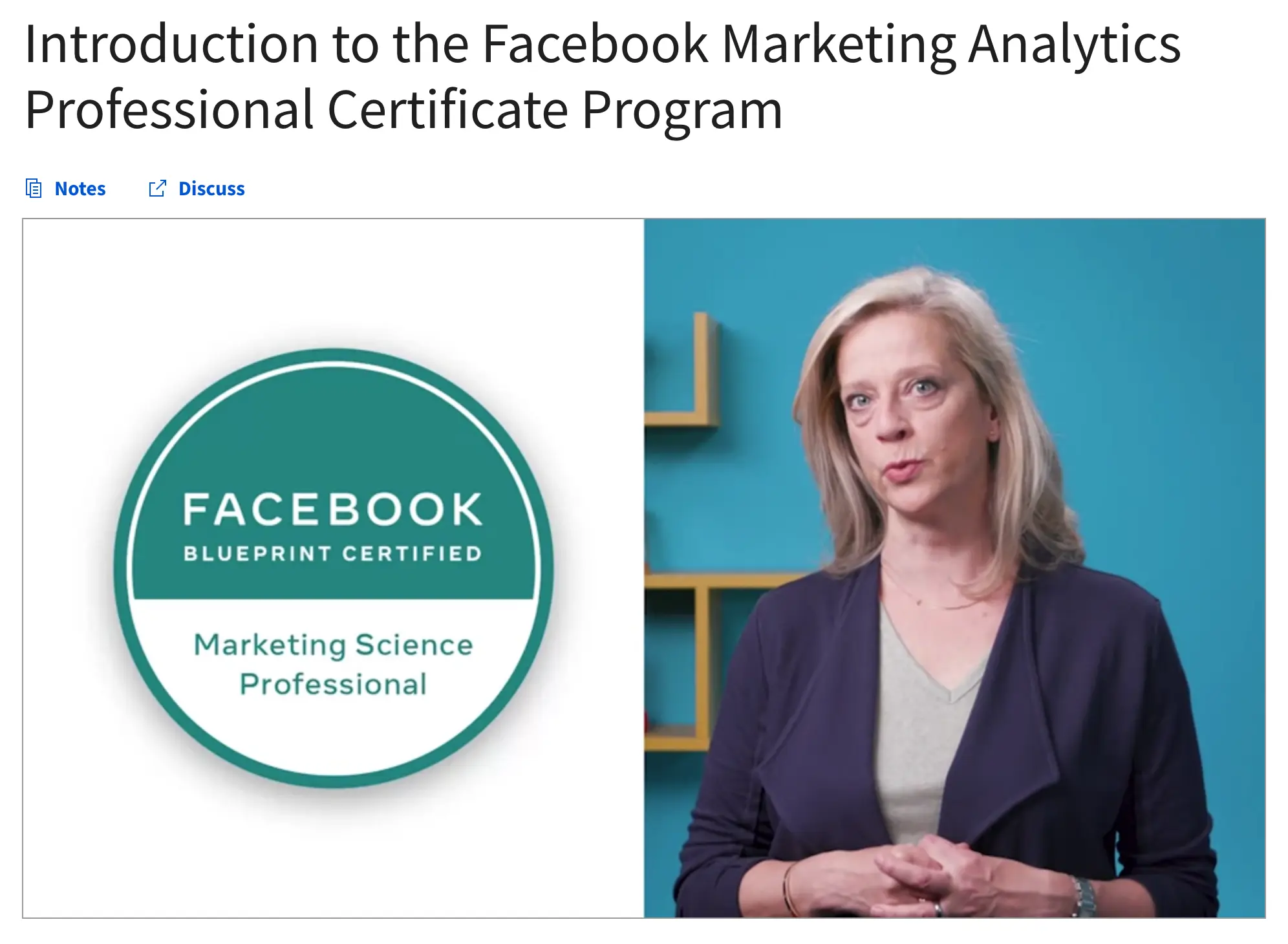
There’s also an overview of how privacy regulations govern the way marketers collect and use data.
This course takes around 12 hours to complete, with a series of 4 modules to finish. During week one, you’ll learn about the value of analytics in marketing, explore the careers available in marketing analytics, the 5 main uses of analysis, and how to “plan and forecast” campaigns.
There’s also an overview of how advertisers can optimize marketing strategies and sales funnels.
In week 2, Meta covers the types of data businesses use to guide their campaigns, including information around online/offline behavior, sampled/non-sampled data, and third, first, or second-party data sources. There’s also an overview of browser cookies, tags and pixels, SDKs for mobile apps, and the use of UIDs in data collection.
Week 3 covers common marketing measurement tools leveraged by today’s marketing professionals. Students will build a Google Analytics demo account, and learn how to evaluate outcomes within Google analytics. You’ll also get an insight into Facebook Ads Manager, and Google Ads. There’s a set of 9 practice exercises to assist you in understanding each tool.
The last week of this module looks at data and privacy in the analytical world. Meta covers everything from “responsible advertising” to the importance of data protection, and how to check your data settings on channels like Facebook. There’s also a graded quiz on data and privacy.
| Topic | Time To Complete | |
|---|---|---|
| Week 1 | The Importance of Analytics in Marketing | 3 hours |
| Week 2 | Marketing Data Sources | 3 hours |
| Week 3 | Marketing Measurement and Analytics Tools | 4 hours |
| Week 4 | Data and Privacy | 2 hours |
Course 2: Introduction to Data Analytics
The second course in the Meta Marketing Analytics certification equips students with practical knowledge of capturing and using data.
The course provides a framework for basic analytical tasks like collecting, cleaning and manipulating data with the “OSEMN” cycle.
This is one of the most comprehensive modules in Meta’s program, including 36 hours of content spread over 5 weeks. There are also 22 quizzes to complete throughout the modules.
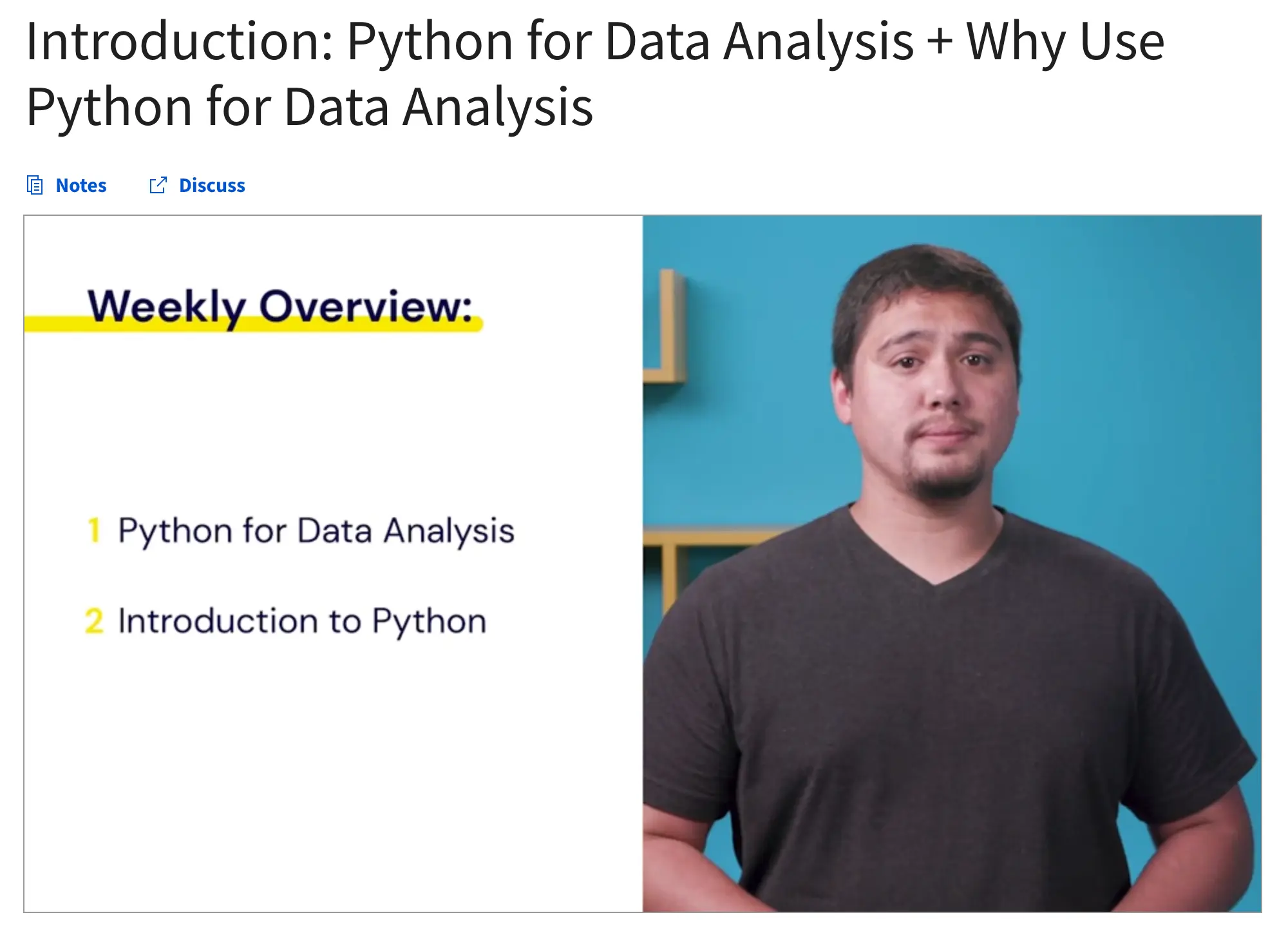
Week 1 begins with an introduction to working with data. You’ll learn how to set goals, objectives, and KPIs for marketing campaigns, and explore the “OSEMN” framework for data management. Several case studies will guide you through the step-by-step process of managing information.
In week 2, students gain a hands-on insight into using Python for data analysis. This course covers foundational programming concepts, like how to use Python variables, data structures, conditional statements, and iteration tools. There are 2 graded quizzes at the end of this course, covering how to load, run, and leverage Python programs.
Week 3 covers guidance on improving the quality of marketing data, with data cleaning and processing. Students learn how to use data in spreadsheets, examine SQL queries, and import “Pandas” for data cleaning. There are deep-dive insights into data frames, grouping aggregates and statistics, and how to use column statistics. There’s also a graded quiz on Pandas and SQL.
In week 4, students learn how to turn unstructured data into visual insights via the “Tableau” platform. Meta introduces common chart types, how to connect CSV and Excel data, design a dashboard, and use storytelling techniques in data presentations. The graded quiz tests your knowledge of data visualization and Tableau functionality.
Week 5 finishes the module by asking students to create their own data analytics project. You’ll learn how to obtain data for a capstone project, and combine the data collected throughout the rest of the course to highlight valuable findings in a report.
| Topic | Time To Complete | |
|---|---|---|
| Week 1 | Working with Data | 3 hours |
| Week 2 | Python for Data Analysis | 10 hours |
| Week 3 | Data Cleaning and Processing | 10 hours |
| Week 4 | Introduction to Data Visualization | 4 hours |
| Week 5 | Structuring Real-World Analytics Projects | 10 hours |
Course 3: Statistics for Marketing
Course 3 in this meta certification dives deeper into the statistical platform on which all marketing analysis is built. This course is delivered over a series of 5 weeks, with 17 hours of content to cover. Throughout each lesson, students learn how to understand data sets, ask questions about their data, and answer those queries with in-depth analysis.
Week 1 starts with an introduction to descriptive statistics and “Bayesian” statistics. The lessons cover concepts like variance in marketing analysis, standard deviation, and using Z-scores to judge a value. Students will learn how to use contingency tables and leverage conditional probability. There’s also a graded quiz on descriptive analytics, covering frequency, contingency, scatterplots, and correlation in data.
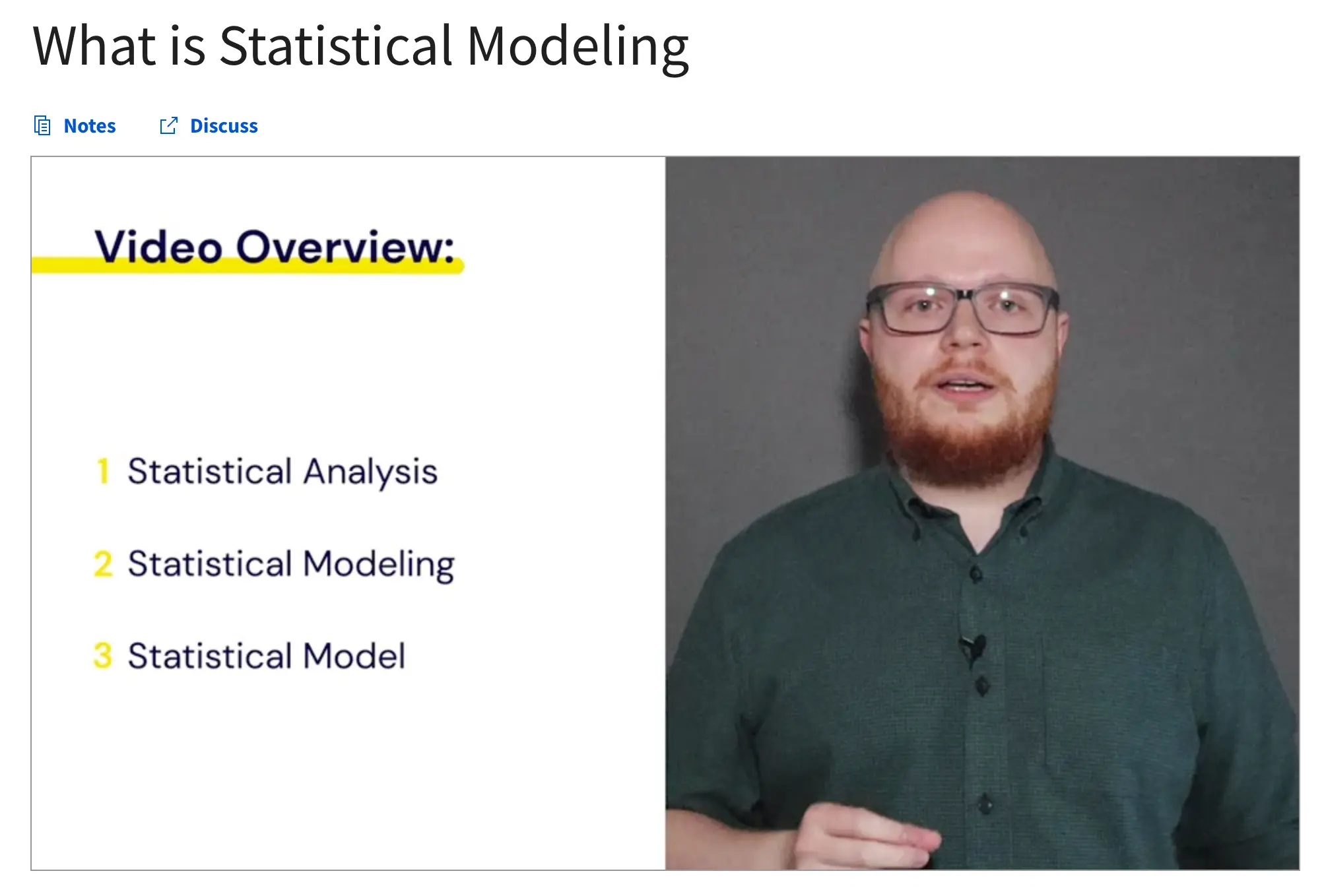
For week 2, Meta provides students with an introduction to making predictions with “inferential statistics”. Users learn how to define samples and populations for marketing, and leverage the power of variables. There’s an introduction to practical sampling techniques, common distributions in marketing analysis, and how to explore different data types. The graded quiz focuses on sampling, distribution, and variable techniques learned throughout the week.
In week 3, Meta teaches students how to formulate and test their marketing hypotheses. There’s an introduction to A/B testing, P-Values, and confidence intervals, as well as how to avoid common mistakes and biases in the analysis. Students will have an opportunity to write their own hypotheses, and explore the risks associated with false positives and negatives.
Week 4 builds on your existing knowledge of statistics and data with an introduction to statistical modeling. Meta covers simple linear regression and classification methods, how to choose models for data analysis, and what techniques are involved with cluster analysis. There’s a graded quiz on statistical modeling, and various practice quizzes to explore.
In week 5, students will apply all of the information they’ve learned throughout the course in a capstone project. This will involve a comprehensive hands-on project where you’ll create a hypothesis, launch marketing tests, and create a data visualization model.
| Topic | Time To Complete | |
|---|---|---|
| Week 1 | Descriptive Statistics | 4 hours |
| Week 2 | Making Predictions with Inferential Statistics | 3 hours |
| Week 3 | Designing Experiments and Testing Hypotheses | 4 hours |
| Week 4 | Data Modeling | 4 hours |
| Week 5 | Using Statistics in Real-World Settings | 2 hours |
Course 4: Data Analytics Methods for Marketing
Course number 4 in the Meta Marketing Analytics certification explores the common analytics methods marketers use to answer common questions about their campaigns. Students learn how to define their target audience and use segmentation with K-means clustering. There’s also an insight into linear regression for planning and forecasting.
The course is split into 4 weeks with approximately 12 hours of content and 14 quizzes to test your knowledge.
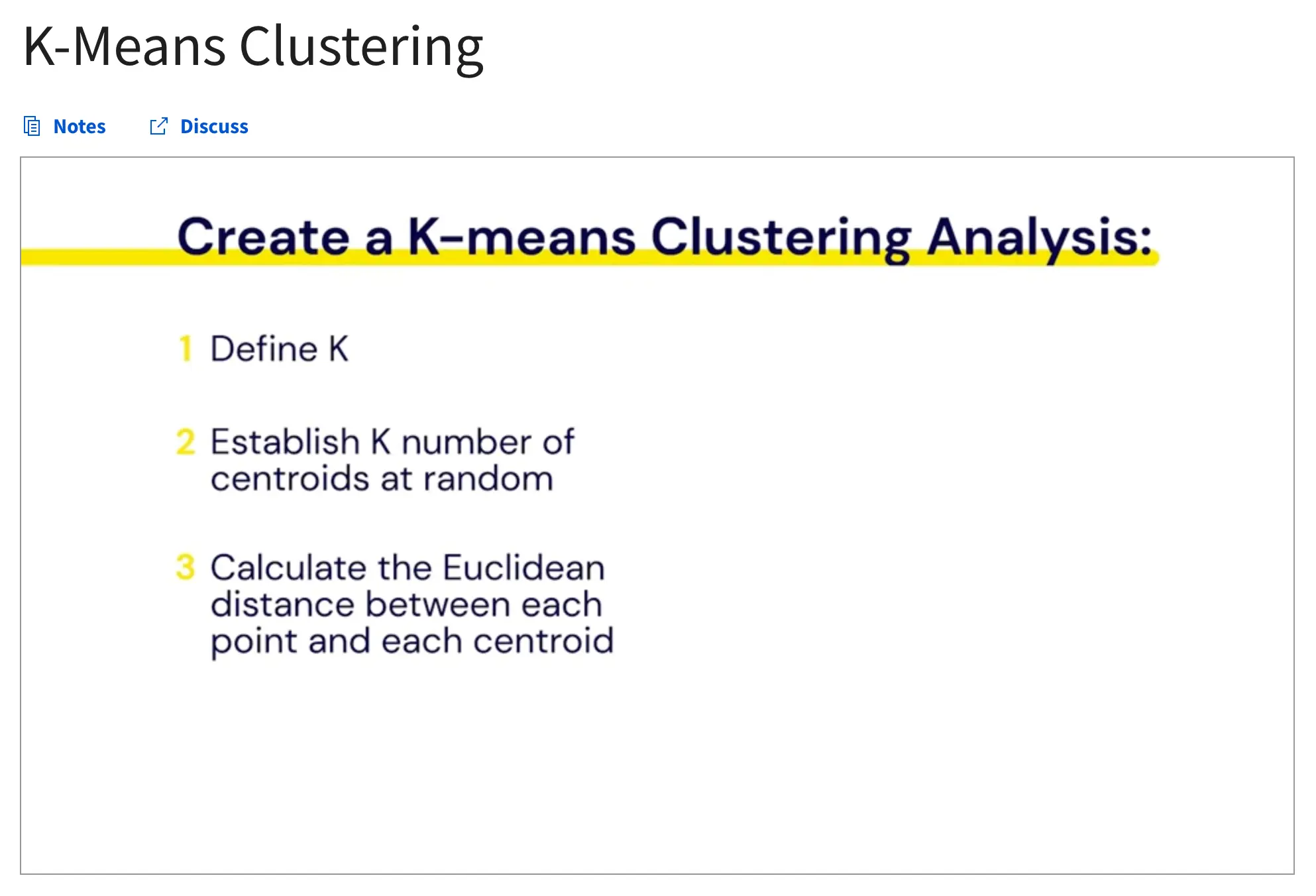
In week 1, you’ll begin by exploring the importance of segmentation and audience analysis in marketing. Meta guides students through customer data platforms, how to segment using clusters, and how to create programmatic creative for audience segments.
Week 2 moves on to a discussion of analytics for planning and forecasting purposes. Here, students can learn all about “ROI” (Return on Investment) and “ROAS” (Return on Ad Spend), as well as how to calculate and understand Customer Lifetime Value. Meta covers everything students need to know about evaluating customer profit, using linear regression, and exploring forms of regression analysis.
Week 3 covers how students can evaluate the effectiveness of advertising campaigns. You’ll learn how to formulate a hypothesis, create experiments like controlled trials, and A/B testing campaigns, and how interpret experimental results. The graded quiz looks at everything from single-cell, multi-cell, and nested tests to basic formulas for experimentation.
In your final week, you’ll be introduced to the various marketing mix models business leaders use to understand their audience. This week looks at the concept of attribution, and the challenges leaders face when measuring analytics across channels. Meta also covers how to understand and build sales funnels, with visualizations in Tableau.
| Topic | Time To Complete | |
|---|---|---|
| Week 1 | Find Your Audience With Segmentation | 3 hours |
| Week 2 | Analytics for Planning and Forecasting | 3 hours |
| Week 3 | Evaluating Advertising Effectiveness | 2 hours |
| Week 4 | Optimizing Your Marketing Mix | 4 hours |
Course 5: Marketing Analytics with Meta
Ideal for those interested in Facebook marketing science and analytics, course 5 looks specifically at the tools available from Meta for marketing analysis. Following an introduction to how the Meta advertising platform works, you’ll learn to build ads with Meta Ads manager, then use the reports available to understand how your campaigns are performing.
This course is split into 5 weeks and 13 hours of content, starting with a “fundamental” introduction to Facebook Ads manager on week 1. The first week covers tips on how to navigate the Meta ads auction, set objectives, determine your target audience, and build ad creative. There are overviews into bid strategies, selecting placements and delivery methods, and how to create ads.
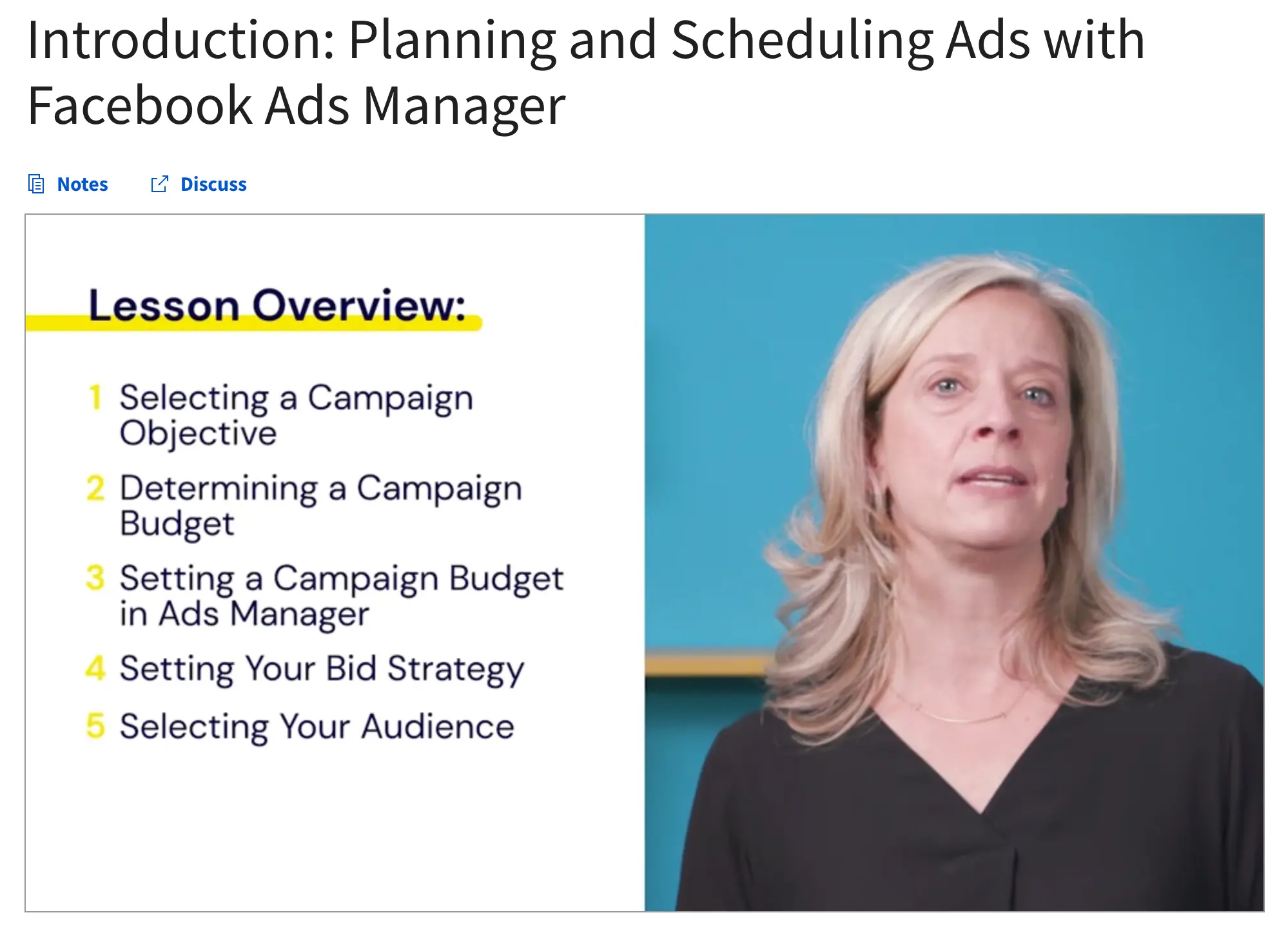
In week 2, you’ll use your knowledge of the Meta marketing platform to discover how you can analyze your campaign results. The course looks at how to evaluate marketing results against business goals, examine attribution, and understand business insights. The graded quiz will test your understanding of how to use marketing analytics tools in Meta.
Weeks 3 and 4 looks at running and optimizing your marketing mix. In week 3, students learn how to conduct Facebook experiments like conversion lift and brand lift tests. Week 4 dives into the benefits of the A/B tests, structuring tests with Meta, and how to model your marketing mix based on your understanding of your audience and campaigns.
Week 5 closes the course with a deep dive into how users can assess their goals and KPIs with hypotheses in Meta Ads Manager. Students will learn how to perform an analysis, generate insights, and present results with data-driven recommendations. There’s a graded quiz to help you test your measurement strategies.
| Topic | Time To Complete | |
|---|---|---|
| Week 1 | Fundamentals of Facebook Ads Manager | 4 hours |
| Week 2 | Analyzing Campaign Results | 2 hours |
| Week 3 | Running Facebook Experiments | 2 hours |
| Week 4 | Optimizing Your Marketing Mix | 2 hours |
| Week 5 | Marketing Analytics in Action | 3 hours |
Course 6: Meta Marketing Science Certification Exam
The final course in the Meta Marketing Analytics Professional certification aims to prepare students for their Marketing Science examination. There’s a guide to scheduling and taking your exam through the Meta Blueprint, as well as access to various study guides and practice tests.
The first week introduces everything you need to know about the Meta Marketing Science exam, how to prepare, and how to enroll. You’ll also have access to various exam preparation resources. In week 2, you’ll complete your exam, and receive top tips on how to prepare for an interview as a Meta Marketing analytics professional.
| Topic | Time To Complete | |
|---|---|---|
| Week 1 | Prepare for and Take the Meta Marketing Science Certification Exam | 1 hour |
| Week 2 | Career Support and Congratulations! | 12 minutes |
Meta Marketing Analytics Certificate Exams
To successfully complete the Meta Marketing Analytics Professional certificate, students will need to complete all six courses listed above. Each course comes with a series of practice quizzes, tests, hands-on projects, and graded assignments which will be counted towards your final certification.
Most of the quizzes included are simple enough to follow, testing your understanding of the information you’ve collected throughout the course. You’ll also need to complete a capstone project, which will be useful in demonstrating your skills to potential employers.
In the 6th module of the course, you’ll need to register for and take the Meta Marketing Science certification exam.
Here is a sample of how the exam questions look like:
How Hard is the Meta Marketing Analytics Certificate?
The Meta Marketing Analytics Certification is relatively simple to complete, provided you’re willing to put the time into consuming all of the available resources.
The Meta Marketing Analytics certificate is designed specifically for beginners with no prior knowledge of analytics in the marketing world. The content is simple enough to follow, with plenty of videos, case studies, use cases, and resources to guide you through your education.
The quizzes at the end of each week in the course will ensure you can test your skills and build your confidence before you take the exam at the end of the course. There are also plenty of resources to accompany you when you’re developing your capstone project.
With various templates and useful guidelines to assist you in developing your knowledge of analytics, Meta makes the learning process extremely straightforward. Each new module starts with an introduction to the foundations of a specific aspect of analysis, so you can build your knowledge gradually as you go.
Is the Meta Marketing Analytics Certificate Worth it?
The Meta Marketing Analytics Certificate is definitely worth obtaining if you’re interested in digital marketing, or analysis. The certificate will help you to build job-ready skills so you can pursue a new career in an in-demand environment.
What’s more, it’s excellent for specialists in digital marketing who want to ensure they’re getting the most out of each campaign.
Considering this certificate costs less than $300 and can take less than 7 months to complete, it’s definitely worth the time and money. The skills you develop will be transferrable across multiple marketing campaigns throughout the life of your career.
The certification awarded by Meta is highly regarded in the digital advertising landscape, and successful students also gain access to plenty of support in finding a new job. You’ll get interview tips at the end of the course, as well as access to Meta’s exclusive job board.
Other Meta Career Certifications
The Meta Marketing Analytics Certificate is offered as part of the Meta Certifications program. The program includes a number of courses related to social media marketing, digital marketing, and Computing.
You can read our detailed reviews of the most popular Meta certifications to decide which is the best certification for you,
- Meta Front-End Developer Professional Certificate Review
- Meta Back-End Developer Professional Certificate Review
- Meta Social Media Marketing Professional Certificate Review
- Meta Database Engineer Professional Certificate Review
You can also consider pursuing a Google Certification and increasing your chances of finding a job with a higher starting salary or a dedicated data analytics certification.
